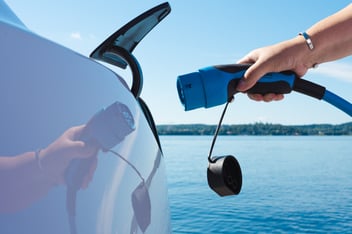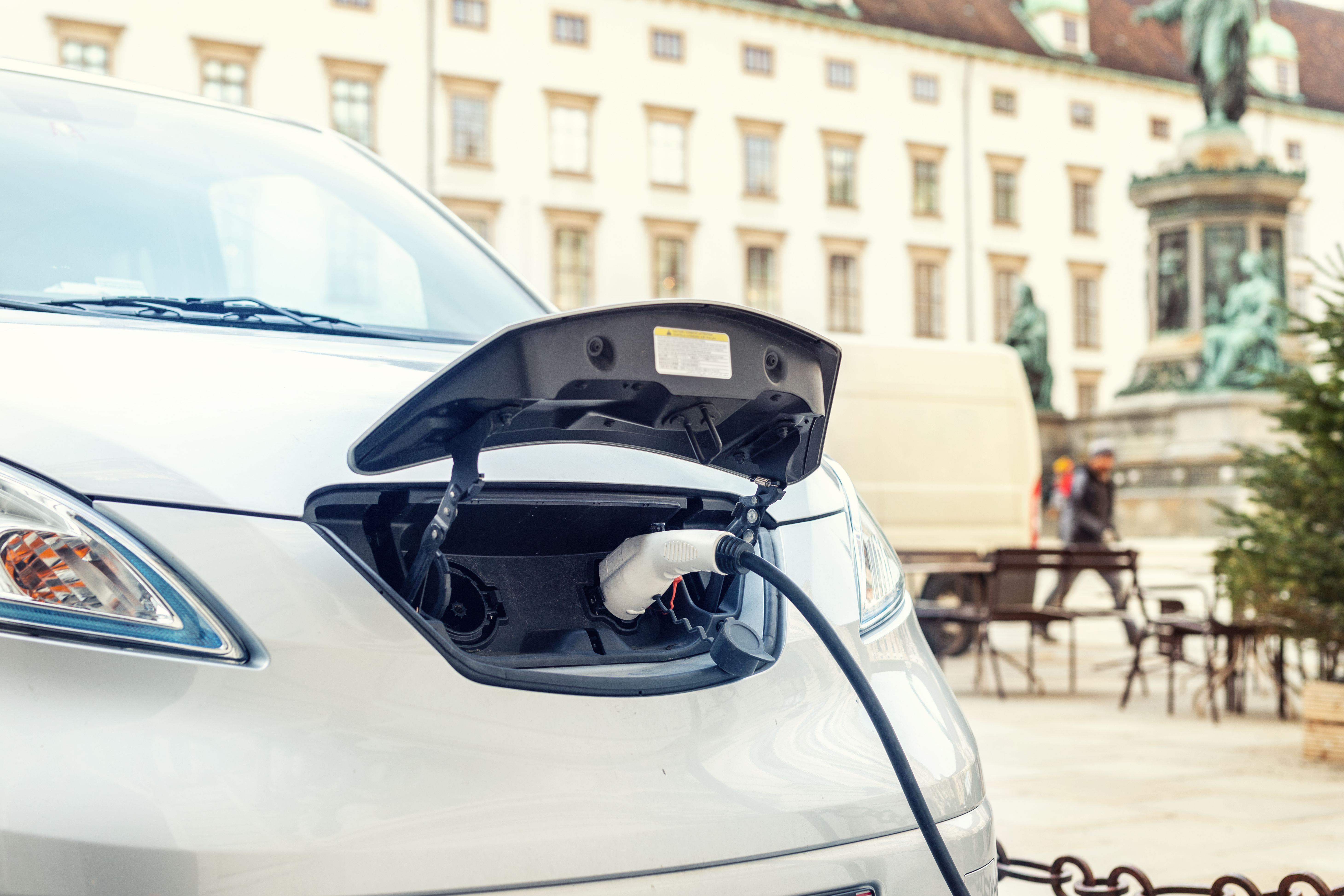
Industry Leaders EVA Global and United Call Centers (UCC) Collaborate to Support Electric Mobility Ecosystem Amid EVA Global’s Bankruptcy
November, 2024 /

Can you tell us about yourselves and how your careers in eMobility kick-started?
For the last ten years or so I have been able to work on energy and climate transition policies at the French, European and International levels with an impactful multisectoral approach, including transport. During this time, I became convinced that the electrification of transport in the broad sense (road vehicles but also ships) was the only possible technological solution to decarbonize this sector. I joined Avere France in 2018, at the dawn of the electric revolution that we are currently experiencing.
- Cécile Goubet, Déléguée Générale, AVERE FRANCE
I have spent my entire career in a large automotive group, alternating positions in France and internationally with operational roles leading major strategic, transversal, and disruptive projects. I have worked in several areas such as Finance, Sales and Marketing, After-Sales, Quality and Reliability, Low-Cost Vehicles, Distribution and Diversity Management. I started with electric vehicles in 2011 in a role focused on sales, marketing, after-sales, and 2nd battery life. I have also participated in studies and projects with Hydrogen and Autonomous Vehicles. As a daily EV driver for the past years and experimenting with the 2nd life of batteries with photovoltaics, together with the storage and charging of an EV, my profile was predestined AVERE France to try and continue contributing to the development of emobility.
- Antoine Herteman, Président, AVERE FRANCE
How did AVERE France come to life?
AVERE France is a national association created in 1978 at the instigation of the European Commission. It represents the entire French electric mobility ecosystem and has more than 200 members from a growing number of sectors within the electric revolution that we are now in the midst of.
As a professional association serving the development of electromobility, Avere France is faithful to its values:
Can you tell us about the role and impact AVERE France has?
For 40 years, Avere France has been playing a central role in the representation of electric mobility in France. It is the entity of reference on topics related to emobility for decision-makers and stakeholders, alike. Avere France has worked, continues to work, establishing a framework conducive to the deployment of emobility, whether this be through regulatory frameworks, incentives, or education.
Since 2016, Avere France has been piloting the ADVENIR program to finance charging points within the region, which currently holds a budget of 100 million euros. As part of the ADVENIR program, Avere France is also setting up a series of information, training, and awareness systems for different audiences: local stakeholders and decision-makers, real estate professionals, and the general public that we make available online and during live events. With action taking place as close as possible within all regions, Avere France also relies on a network of regional associations to be as close as possible to the concerns on the ground.
Avere France therefore fulfils 5 major missions in France:
PROMOTE electromobility with public authorities (local, regional and national authorities) as well as businesses and media, with the purpose of:
INFORM all stakeholders and end users by contributing to the dissemination of objective, reliable and value-adding information.
DEFEND positions favourable to the development of emobility in France and the common interests of players in the emobility sector.
PRESENT the diversity of emobility players, how these complement each other and collaborate, to Public Authorities and the Media.
FEDERATE all stakeholders in sectors, start-ups and mid-cap companies, SMEs, large groups, communities and associations to promote the EV sharing experience.
To this end, Avere France relies on a variety of levers:
Who are AVERE France members today, and who is missing to make it stronger?
The members of Avere France mirror the entire emobility value chain. This covers both battery electric vehicles and hydrogen vehicles. From cities deploying networks or switching their fleets to EVs, suppliers of electrical systems, including energy companies in the broad sense, to developers, CPOs and MSPs, research and training organizations and consulting firms and so on..
Avere France aims to bring together and federate all players having a role in the deployment of emobility. To do this, the partnerships forged always make it possible to build on and promote the expertise necessary for the mass expansion of emobility. Whether it is by bringing together all relevant actors together for the development of a guide (as for the Copro Guide), finetuning a topic such as the White Book on Smart Charging, by working on the convergence of the electric transition with RTE (Réseau de Transport Electrique) to assess the impact of emobility on the grid, or by analysing the links required to work on this with ENERPLAN.
Avere France is now also working hand in hand with the Administration and the federations of freight and passenger transport as part of a study aimed at promoting the deployment of heavy electric vehicles.
Incentives to support demand must be carried out as long as price parity between electric and ICE vehicles is not reached. Simultaneously, supporting the roll out of charging infrastructure that reflects the real requirements in terms of accessible power and location. Simplification efforts must also be continued to allow charging stations to be set up far more quickly.
In the space of two years, Avere France has worked to raise Public Authority awareness of the need to have the right station set up, in the right location, at the right power setting whilst also pushing for the establishment of a framework funding system to facilitate these deployments.
"The right to plug” (home chargers) is also a new regulation in France which has been strongly supported by Avere France. Today, we hope to see all new or collective buildings be electrically equipped to accommodJustate charging easily; these must be compliant with EPBF requirements to facilitate the electric installations needed for deploying individual chargers. Granting subsidies for the purchase and use of EVs is also essential for individuals and companies to start the emergence of a second-hand EV market; this is key for the roll out of the electric vehicle.
Finally, with regard to the EU’s proposals within the framework of AFIR, France is also ahead of the curve with obligations to equip all service areas on motorways with infrastructure before the end of 2022. Subsidies paid through the ADVENIR program piloted by Avere France is complementary to the recovery plan in France. The requirements for both are the same: the conditions require the installation of half of charging points of at least 150kW.
How has the pandemic impacted mobility in general, as well as the progression of emobility in particular in France?
As everywhere, the pandemic marked a big drop in vehicle sales. However, EVs did well in France in terms of market share that reached 16% in June 2021. The pandemic has also allowed the French to think about lower emission mobility, as illustrated in the recent studies we have carried out among EV drivers. The first cause making drivers switch to electric is linked to environmental concerns. This also shows that the “EV bashing” which regularly returns to France is losing ground.
To reassure customers and remove any doubts related to the electric vehicle; its range, or its ability to charge. This applies to light and heavy vehicles but also boats! It is now necessary to agree on common minimum standards to make everything as simple as possible for the mainstreaming of emobility. This requires a review of AFIR.
What do you think consumers want to see develop in the electric mobility market over the next 10 years?
Increased vehicle range; easy access to charging points, either public, at home or at work, together with clear and transparent pricing.
What “trends” do you see happening within the French emobility ecosystem at the moment?
The first trend is at the level of political and economic actors who no longer discuss the “what”, but the “how”. The second trend is at the level of users (individuals and companies) of emobility, who are no longer the “early adopters” (these made up less than 1% of new EV purchases), and whose quantity increases every day (10% of new EV purchases in 2020, and 13% over the first half of 2021).
In your opinion, how can different actors (within industry, government, etc.) work together to further promote the adoption of EVs in France?
By using all the same benchmark indicators and barometers as those of AVERE, to avoid fruitless battles of numbers. Also, by anticipating regulatory, technological, and social changes as much as is possible, whilst remaining flexible in terms of resources and whenever necessary deadlines. The switch to emobility involves all citizens in their everyday, personal, and professional life. Its environmental benefits are vital for all, and it is therefore essential for us to avoid dogmatism. We must find the right path to keep moving forward.
By joining AVERE France, for those who are not yet with us, but above all by continuing to actively contribute to working groups with open and professional dynamism and pragmatism. All of which characterizes our members.
Finally, can you tell us where you think France will be on the “road to emobility” by 2025?
If the incentive framework is moved forward and the offer continues to increase with a growing maturity of the second-hand market, France should continue amongst the two three emobility states in Europe; or, who knows, challenge the leader?
In France, individuals buy 6 times more used vehicles than new vehicles. The supply of electric vehicles in the second-hand market will logically grow very quickly in the coming years thanks to their current success in the new market. It is high time to prepare for this; it requires, above all, that as many people as possible have the right information, as well as training other actors for this purpose. This educational and clarification effort is insufficient in France today; it has to be worked on by sectors including technology, ecology, production (mobility solutions AND charging solutions) and their services, and also on all support measures.
*To showcase the story of an EMOBILITY MAKER, please reach out to public@eva.global

November, 2024 /


July, 2024 / News
